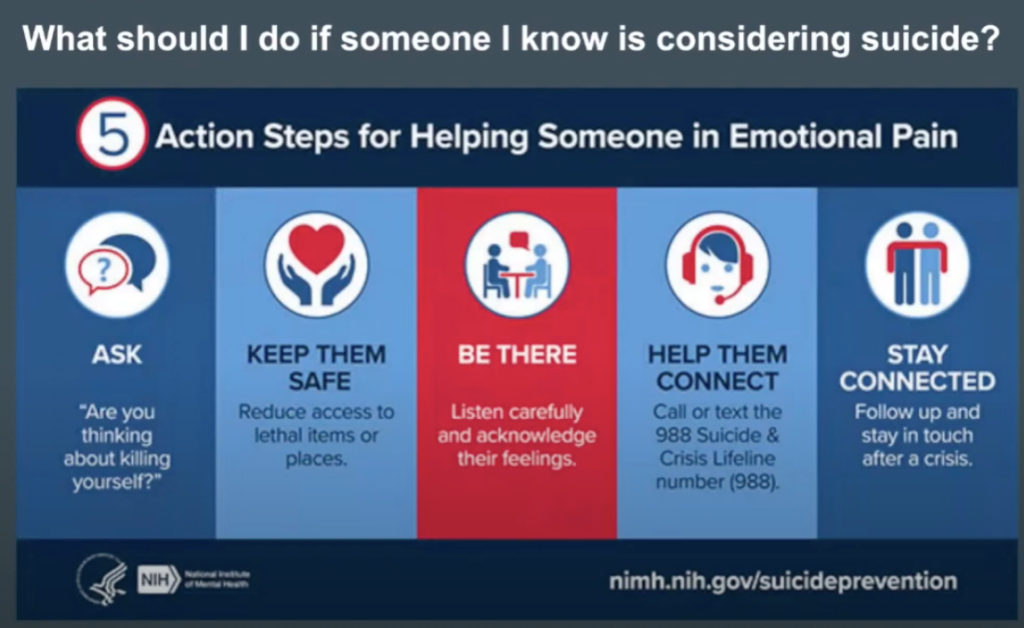Note: If you or anyone you know is in crisis, call/text/chat the National Suicide Prevention Line at 988 or 1-800-273-TALK (8255). Please know that you are not alone.
Suicide is an incredibly complex topic and we cannot just explain this serious topic biomedically, socially, or culturally. It does not do justice to reduce our understanding of suicide, and why it is such a leading cause of death in our country to just 1-2 explanations that lead to suicide. At Oak Health Foundation, we also recognize the need to understand the spiritual nature of how and why suicidal thoughts and attempts occur. We have to attend to the whole process, the mind, body, and spirit of the person.
Facts about suicide:
Suicide is defined as death caused by self-directed injurious behavior with intent to die as a result of the behavior. Suicide attempt is a non-fatal, self-directed, potentially injurious behavior with intent to die as a result of the behavior. Suicide ideation refers to thinking about, considering, or planning suicide.
According to the CDC death reports in 2020, suicide was the 12th leading cause of death overall in the United States, claiming the lives of over 45,900 people. Suicide was the 2nd leading cause of death among individuals between individuals 25-34 years old, and 3rd leading cause of death among individuals between the ages of 15-24, and the 4th leading cause of death among individuals between the ages of 35-44. There are 2 times as many suicides as there were homicides. 46% of people who died had a diagnosed mental health condition, but research suggests that 90% may have experienced symptoms of a mental health condition.
Myths about suicide:
- Myth #1: “People who say they are going to take their own life are just attention seeking and shouldn’t be taken seriously.” Suicidal thoughts and actions are sign of extreme distress, an indicator that someone is in need of help. Talking about, or expressing desire for suicide, is NOT a typical response to stress. ALL talk of suicide should be taken seriously and requires immediate attention. It may well be that they need attention in the sense that this talk of suicide is a cry for help. And helping them get support may save their life.
- Myth #2: “Talking about suicide is a bad idea as it may give someone the idea to try it.” Sure, suicide can be a taboo topic. Often people who are feeling suicidal they do not want to worry anyone or burden anyone with their feelings so they do not discuss it, but by asking someone directly about suicide, you give them permission to tell you how they feel. People who are struggling or who felt suicidal will describe feeling a huge sense of relief having the permission to talk about what they are experiencing. Evidence shows asking someone if they are having suicidal thoughts can protect them.
- Myth #3: “People who die by suicide are selfish and are taking the easy way out.” Typically do not die by suicide because they do not want to live. People die by suicide because they want to end their suffering. These individuals are suffering so deeply that they feel helpless and hopeless. Individuals who experience suicidal ideation do not do so by choice. They are not simply thinking about themselves selfishly, but they are going through a very serious mental health symptom due to their mental illness or due to a very difficult life situation.
- Myth #4: “Suicide only affects individuals with a mental health condition.” Many individuals with mental illness are not affected by suicidal thoughts, and not all people who attempt or die by suicide had a mental illness. Relationship problems, other significant life stressors and crises can trigger suicidal thoughts and attempts.
- Myth #5: “Someone who has their act together isn’t at risk of suicide.” This is a very common one, actually. On the outside someone can appear to have it all. A great job, a great marriage, stable finances, healthy family, active social life, beautiful home, fame – but you really don’t know what is going inside of someone.
- Myth #6: “If a person is serious about killing themselves, then there is nothing you can do.” There is a misconception that a suicidal person will find a way to take their own life, no matter what. This fuels a dangerous notion that is useless to reach out to someone who is contemplating suicide. When in fact, nothing can be further from the truth. When people are suicidal, they are highly ambivalent. They are unsure about suicide. They can feel torn between the desire to live, and the desire to die. It is why TALKING THROUGH other options is so important.
RISK FACTORS
Suicide does not discriminate but we can learn some of the risk factors:
- Depression, other mental disorders, or substance use disorder
- Chronic pain
- History of suicide attempts
- Family history of suicide
- Exposure to family violence, including physical or sexual abuse
- Recent release from prison or jail
Most people with risk factors will not attempt suicide – just because you have one of these risk factors will not make someone go and attempt suicide – but it is difficult to tell who will act on their thoughts, and who won’t. So we also need to learn about WARNING SIGNS.
WARNING SIGNS:
Who may be at immediate risk of wanting to commit suicide? People who do the following may be at immediate risk for wanting to commit suicide:
- Talking about wanting to die or wanting to kill themselves
- Talking about feeling empty or hopeless or having no reason to live
- Talking about feeling trapped or feeling there are no solutions
- Talking about feeling great guilt or shame, or being a burden to others
- Talking or thinking about death often
- Feeling unbearable emotional or physical pain
- Displaying extreme sudden changes in mood swings
- Acting unusually anxious or agitated
- Withdrawing from family and friends
- Saying goodbye to friends and family
- Giving away important possessions
- Putting affairs in order, such as making a will all of a sudden
- Taking great risks that could lead to death such as driving extremely fast, using alcohol or drugs more often
- Making a plan or looking for ways to kill themselves such as searching for methods online, stockpiling pills or buying a gun
Should parents be concerned about teen suicide?
Suicide is in popular entertainment and news more than ever, especially in regards to teenagers. We are seeing the rise of teenage suicide. As a parent you can definitely play a role in building up your child’s mental awareness by simply:
- Being aware of risk factors and warning signs of suicide, or even just being aware of mental illness in general.
- Making yourself available for them despite busy schedules.
- Knowing how to have a caring conversation.
- Being aware that help is always available (resources below).
How can I understand suicide comprehensively on a biological, social/psychological, and spiritual level?
We need to think about suicide on a biological level, social level, psychological level, and absolutely do not forget on a spiritual level. If someone is suffering from chronic physical pain and then you discover that they are also undergoing constant toxic exposure such as an abusive relationship, that negative environment should not be ignored. You cannot simply treat the ongoing physical pain this person is going through, you also have to address the personal, social issues they are experiencing. You need to understand the situation holistically.
You cannot also do this on a spiritual level. You cannot go to your friend who is having suicidal thoughts and tell them simply “you just need to pray more!” or “you need to go church more! Just have more faith!” Suicide is a much more complicated problem.
When someone, Christian or not, reaches the point of persistently experiencing feelings of hopelessness, worthlessness, helplessness, and frequently feeling meaningless, purposeless, uselessness, then suicidal ideations and contemplation of ending their own life can occur.
When someone feels constant, unrelenting pain, it can become unbearable. Each day can feel so dreadful, and fulfilling a basic daily need can become an absolute chore. The hours and days ahead can become bleak and blurry, causing confusion and chaos in the mind. The loneliness in the heart is so dark and dismal, leading to thoughts of “I do not belong here.” The belief that there is someone out there who understands you, who can speak to you, diminishes. The physical body can feel so heavy, as if you are maneuvering yourself around with heavy chains. The paradoxical thoughts of wanting to live, while simultaneously feeling suicidal can make someone feel like they are going insane.
Separation from God and relationship to suicide:
When God first created mankind in the beginning, none of these descriptions were there. God created man to be WITH God, with no unmet needs, fully happy and at peace. Adam and Eve were given their identity, shaped in the image of God, and were given an amazing purpose – to multiply and subdue the earth. But then, the enemy of God deceived humanity to disbelieve God’s word causing the original sin which led to spiritual death and curses in life. Like fish out of the water, man cannot live and be happy separated from God. After the incident in Genesis 3, of the fall of man, we now live in a world that cannot escape problems and curses in all areas of human life. We now also live in a spiritual state prone to all kinds of awful conditions and situations – situations like horrible medical diseases, and for others disasters and tragedies that ruin and destroy lives, and for others emotional and mental struggles that lead to reduced motivation to continue living.
This suffering results from the root problem of spiritual separation from God. Not only that, the suffering on Earth is explained by Satan’s power in our world around us and within our own lives. Satan is NOT talked about at all in regards to suicide. He hates God, and he hates His most precious children.
This enemy has 2 goals:
- Prevent people meeting God again and being saved from sin, to blind people to live and die on Earth without knowing Christ and not understanding their true identity of being restored in the image of God.
- To prevent understanding and enjoyment of salvation within the believers, Christians, those who have accepted Jesus. His aim is for Children of God to continue living in misery, dampen their light, so others are not attracted to the light of Christ. He wants to cast a shadow on God’s message of love and grace.
Satan would love to kill someone off before their chance to meet Jesus and be saved. It is in fact a strategy of Satan to fan the flames of depression and suicidal ideation in the believer. Satan always has had a role in this urgent, time-sensitive problem of suicide:
- John 8:45 – “The devil was a murderer from the beginning, not holding to the truth, for there is no truth in him. When he lies, he speaks his native language, for he is a liar and the father of lies.”
- Satan can play a role to block the person in taking steps to get treatment.
- For example, let’s say someone made a grave mistake that causes extreme shame and guilt like Judas Iscariot. Satan can influence the person’s mind to think that they are no longer worthy enough to live longer and end their life, that God will no longer accept you. Satan can also influence a sense of hopelessness, as if the future will never get bright.
- John 10:10 – “The thief comes only to steal, and kill, and to destroy; I have come that they may have life, and have it in full.”
- The fight against suicide must include a deeper comprehension of how Satan works, and how he wants you to be separate from God.
The gospel and how it can help those suffering from suicidal thoughts:
- Romans 5:8 – Though the spiritual root problem cannot be solved by human effort such as man-made creation such as man-made religion or religiosity, there is good news. God provided us a solution – he demonstrated his love for us by Jesus dying on the cross while we were still sinners.
Jesus is the Christ who completed the work of the prophet, priest, and king, bridging us to God, removing the sin, and destroying Satan’s captivity. Once we believe and receive this gift, we become a child of God and now God is with us. This means we have the right to experience all the lessons intended for me, and everything wrong will become right.
One must really believe that the meaning and purpose of life is to know and enjoy the deep love of God and believe in God’s unconditional love demonstrated in Jesus Christ, and understand the undeserved favor of God knowing Jesus died for me because He loved me.
- Romans 8:38-39: For I am convinced neither death nor life, neither angels nor demons, neither the present nor the future, nor any powers, neither height nor depth, nor anything else in all creation, will be able to separate us from the love of God that is in Christ Jesus our Lord.”
- John 3:8 – The son of Man appeared for this purpose, to destroy the works of the devil.” We have to keep fighting the enemy since he will not stop disturbing us.
God gives us strength and desires to reveal His plans for us on earth before we go meet him in paradise. He even desire to use this suicidal issue for you to overcome and become closer to Him.
So what are the main takeaways from the gospel in relation to my suicidal thoughts?:
- God loves you. You are His beloved! That will never change.
- In Christ, you are fully accepted, fully forgiven, fully valuable, fully loved. Your life is NOT worthless, useless, purposeless.
- He is with you right now within the storm, within the fire. You are not alone. The darkness right now is walking through a dark tunnel but there is light at the end of it.
- Help is available: suicide is preventable. Mental illness is treatable, and you must not battle this alone.
RESOURCES:
What should I do if someone I know is considering suicide? Family and friends are among the first to see warning signs. If you see behavior in yourself or in yourself, you can take these 5 action steps:

ASK: It is not an easy question but asking someone if they are feeling suicidal does NOT increase rate of suicide or suicidal thoughts Studies show that asking them does help prevent it. Ask directly about it without judgement. Take their concern seriously. Let them know their life matters to you. This one conversation can save a life.
KEEP THEM SAFE: Reduce their access to lethal items or places.
BE THERE: Listen carefully, acknowledge their feelings – talking about this does not increase thoughts of suicide but instead helps them feel relieved that they are being listened to.
HELP THEM CONNECT: Call or text the 988 Suicide & Crisis Lifeline number (988).
STAY CONNECTED: After the crisis is over, follow up and stay in touch. It is not weird to ask or check-in.
How to find mental health treatment services in your area:
www.SAMSHA.gov or call the SAMHSA Treatment Referral Helpline at 1-800-662-HELP (4357).
www.psychologytoday.com – a search engine for every state in the USA to find a local mental health clinician and program.
www.fullyhealth.org – sponsored by Oak Health Foundation that provides medication management, psychotherapy services, and spiritual care services.
www.oak.care – great resource if you have insurance such as Anthem Blue Cross, CIGNA, AETNA, Optum, etc.
Enjoyed our blogpost? Subscribe to our newsletter for more resources on mental health and integrating the Gospel message in your healing journey.
If you found our resources useful, please consider donating to Oak Health Foundation, which is a 501(3)c nonprofit dedicated to providing resources regarding holistic mental healthcare and subsidized treatment for those in need.




